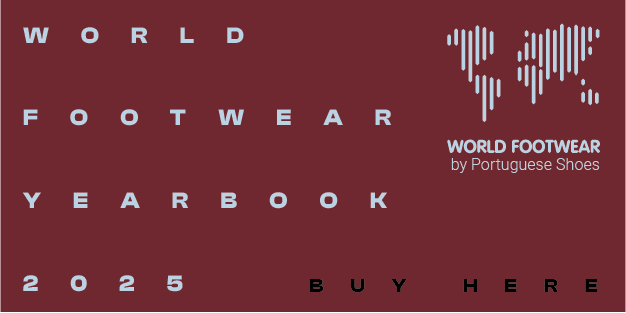J. Francisco Dos Santos, Founder and President of COUROMODA, live on World Footwear

As we prepare to the World Footwear Congress in Léon we spoke to Mr J Francisco dos Santos, one of the speakers at the event
As Founder and President of Couromoda, the footwear sector’s largest exhibition and industry forum in South America, he has been instrumental in the development of all phases of the Brazilian shoe sector since 1968. He pioneered the commercial promotion of Brazilian shoes in foreign countries, organizing and leading more than 100 official participations in European and American exhibitions by Brazilian footwear exporters. Working with the same concept as consolidated Couromoda as a sectorial institution, he has increased his trade show entrepreneurial skills in sectors beyond footwear, with the company, Sao Paulo Trade Fairs, with leading fairs and forums in the fashion, beauty and well-being, medical and healthcare sector. Together, these sectors are responsible for over 12% of Brazilian GDP. All of the events organized under his direction are international with participants from more than 70 countries. Each year his events feature more than 3 500 exhibitors and host more than 120 000 professional visitors in Sao Paulo, Brazil’s main economic centre.
What’s your view of the recent evolution of the footwear industry worldwide and in particular the Brazilian market?
The footwear industry, as other economic sectors, had to adapt itself to the inevitable globalization of markets and the strong changes that the popularization of fashion led, and still leads, in trade relations between industry and retail.
Power is no longer just in the hands of those who hold high productive capacities but with those who can offer innovation, constant updating of products, with the speed that the consumer requires. All this is complemented with post-sale retail services, which require partnerships with manufacturers and not just the traditional trade process between suppliers and buyers. Brazil is not different. Our industry has kept up with the rapid growth of domestic consumption (which almost doubled in the last 10 years), even competing with Asian products coming into the country "dribbling" the antidumping law. Brazil dominates all production technologies, has modern and updated plants and has internal suppliers of raw materials and machines that can supply 100% of its needs, with emphasis on self-sufficiency in leather.
There is a debate about the positioning of retail to face the growing interest in online. What’s the importance of the retail segment for the sector and what are the main challenges faced?
The internet and new information technologies (IT) impact every industry and trade, not only with respect to consumer purchasing decisions.
It is undeniable that online sales are growing and trends indicate that this process should continue. However, we do not believe that the virtual store will replace the physical stores, at least in the clothing and footwear market, where the buying experience (feel the product, dress it and to try it on) makes all the difference when deciding between different models.
In Brazil we have many retail companies acting in the two fronts: physical and virtual stores and in these cases, the proportion of sales of shoes has remained around 95% in physical stores.
On the other hand, the use of IT in physical stores is an ever-present reality, especially in the relationship with suppliers, seeking closer commercial actions, more economical solutions and faster replacement of inventories. But technology also has strong importance managing the relations of the store with their clients as any retail store without continuous networking actions with customers will lose ground in customer’s loyalty and in the process to ensure the return to the store, something fundamental to businesses.
In this scenario, industries not incorporating IT in their production and distribution processes, will face greater difficulties to maintain their business and their distribution base.
In your opinion what are the major challenges for the Brazilian footwear sector in the coming years? What are the priorities that need to be taken into account by Brazilian companies?
The Brazilian retail (and we believe that the same occurs in worldwide retail) is still adjusting to a market that requires continuous innovations and renovations at the shops, a market that no longer sells "only" shoes but also fashion. That is positive as it generated (and continues to do so) strong growth in consumption. But also leads to an increased risk of the purchase, at the volume and type of product to stock. This increased risk has led retailers to revise their purchasing policies, with a significant reduction in average store inventories, leading to negotiations with manufacturers, seeking the shortest time between the request and the arrival of the product at the store.
Importantly, among other consequences, is the reduced number of pairs by request and the release of several intermediate collections between the two main collections of the year: spring / summer and autumn / winter. Given this reality, the industry has to negotiate with its raw material suppliers, which is not an easy task, but necessary and essential to win and not lose the spaces already conquered.
Brazil through its territory of continental size, features well-differentiated marketing realities between various geographical regions and this requires product’s policies, designs, styles and prices tailored to each of these regions. These large distances, with marked differences in climate and consumption habits, require intelligence in distribution and at the replacements in retail. The presence of Brazilian factories in more than 15 of the country’s states was important to balance the cost / price relation and to decentralize the distribution policies while serving retail.
Among other challenges, we identify the need to regain the share of the world market that our industries have failed to maintain, in face of the competition from Asian products, especially Chinese. Our companies have worked hard in this sense, in the occupation of a niche less impacted by Chinese shoes, and in the development of trade missions and in the presence of our companies in the most important world fairs.
Can you please share with our readers the main reasons to participate at the World Footwear Congress in Léon?
The economy currently demands companies to be connected to the challenges surrounding their activity. That's not different in the footwear industry, especially as fashion and consumption's conditions change every six months. The congress in Léon will be a unique opportunity to consolidate the relations with the main industry and retail players from across the globe. More than a congress, the WFC will allow strong interaction between participants and an exchange of ideas and experiences that is only possible to occur in such an environment, where we all be in a kind of "away day" for a couple of very intense and productive days.
Themes are varied and with global reach; speakers have wider experience and knowledge and the audience will be highly qualified. Whoever decides to go to León will return home with more tools to face the new challenges, while producing with more quality and being able to compete in an ever changing global market.
Related Events
Related Organizations
-

ABRAMEQ - Brazilian Association of the Machinery and Equipment for the Footwear and Leather Industries
-

CICB - Centre for the Brazilian Tanning Industry
-

ASSINTECAL - Brazilian Association of Companies of Components for Leather, Footwear and Manufactured Goods
-

ÁPICE - Association of the Industry of Sporting Goods











